

What is Critical Thinking in Nursing? (Explained W/ Examples)
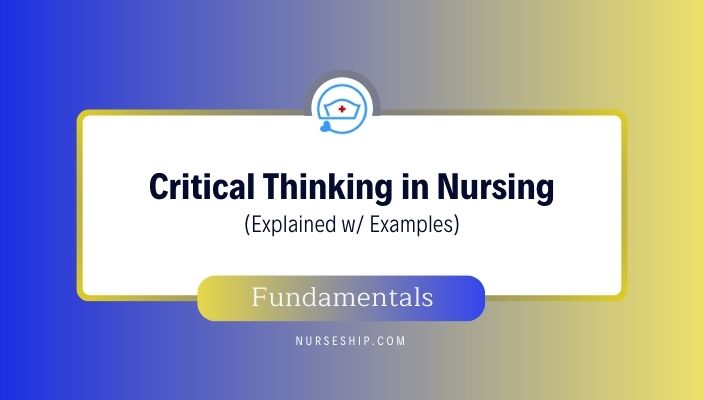
Last updated on August 23rd, 2023
Critical thinking is a foundational skill applicable across various domains, including education, problem-solving, decision-making, and professional fields such as science, business, healthcare, and more.
It plays a crucial role in promoting logical and rational thinking, fostering informed decision-making, and enabling individuals to navigate complex and rapidly changing environments.
In this article, we will look at what is critical thinking in nursing practice, its importance, and how it enables nurses to excel in their roles while also positively impacting patient outcomes.
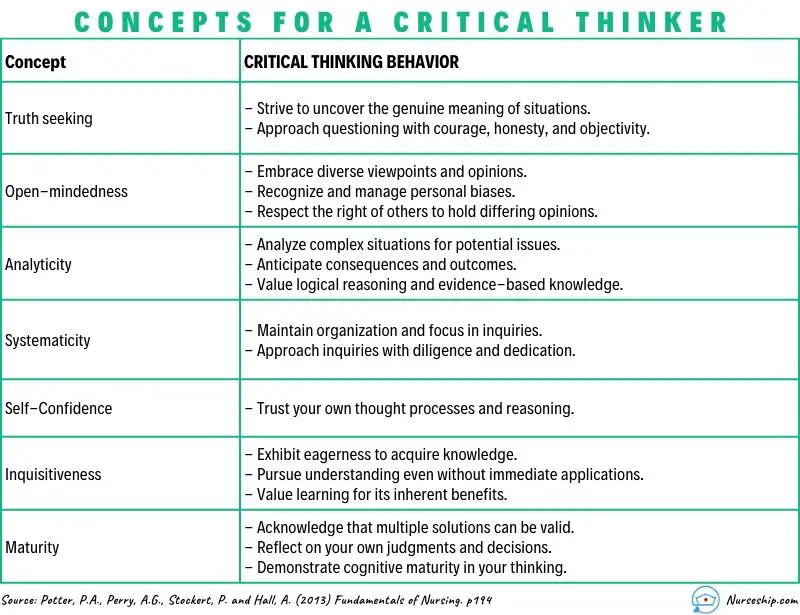
What is Critical Thinking?
Critical thinking is a cognitive process that involves analyzing, evaluating, and synthesizing information to make reasoned and informed decisions.
It’s a mental activity that goes beyond simple memorization or acceptance of information at face value.
Critical thinking involves careful, reflective, and logical thinking to understand complex problems, consider various perspectives, and arrive at well-reasoned conclusions or solutions.
Key aspects of critical thinking include:
- Analysis: Critical thinking begins with the thorough examination of information, ideas, or situations. It involves breaking down complex concepts into smaller parts to better understand their components and relationships.
- Evaluation: Critical thinkers assess the quality and reliability of information or arguments. They weigh evidence, identify strengths and weaknesses, and determine the credibility of sources.
- Synthesis: Critical thinking involves combining different pieces of information or ideas to create a new understanding or perspective. This involves connecting the dots between various sources and integrating them into a coherent whole.
- Inference: Critical thinkers draw logical and well-supported conclusions based on the information and evidence available. They use reasoning to make educated guesses about situations where complete information might be lacking.
- Problem-Solving: Critical thinking is essential in solving complex problems. It allows individuals to identify and define problems, generate potential solutions, evaluate the pros and cons of each solution, and choose the most appropriate course of action.
- Creativity: Critical thinking involves thinking outside the box and considering alternative viewpoints or approaches. It encourages the exploration of new ideas and solutions beyond conventional thinking.
- Reflection: Critical thinkers engage in self-assessment and reflection on their thought processes. They consider their own biases, assumptions, and potential errors in reasoning, aiming to improve their thinking skills over time.
- Open-Mindedness: Critical thinkers approach ideas and information with an open mind, willing to consider different viewpoints and perspectives even if they challenge their own beliefs.
- Effective Communication: Critical thinkers can articulate their thoughts and reasoning clearly and persuasively to others. They can express complex ideas in a coherent and understandable manner.
- Continuous Learning: Critical thinking encourages a commitment to ongoing learning and intellectual growth. It involves seeking out new knowledge, refining thinking skills, and staying receptive to new information.
Definition of Critical Thinking
Critical thinking is an intellectual process of analyzing, evaluating, and synthesizing information to make reasoned and informed decisions.
What is Critical Thinking in Nursing?
Critical thinking in nursing is a vital cognitive skill that involves analyzing, evaluating, and making reasoned decisions about patient care.
It’s an essential aspect of a nurse’s professional practice as it enables them to provide safe and effective care to patients.
Critical thinking involves a careful and deliberate thought process to gather and assess information, consider alternative solutions, and make informed decisions based on evidence and sound judgment.
This skill helps nurses to:
- Assess Information: Critical thinking allows nurses to thoroughly assess patient information, including medical history, symptoms, and test results. By analyzing this data, nurses can identify patterns, discrepancies, and potential issues that may require further investigation.
- Diagnose: Nurses use critical thinking to analyze patient data and collaboratively work with other healthcare professionals to formulate accurate nursing diagnoses. This is crucial for developing appropriate care plans that address the unique needs of each patient.
- Plan and Implement Care: Once a nursing diagnosis is established, critical thinking helps nurses develop effective care plans. They consider various interventions and treatment options, considering the patient’s preferences, medical history, and evidence-based practices.
- Evaluate Outcomes: After implementing interventions, critical thinking enables nurses to evaluate the outcomes of their actions. If the desired outcomes are not achieved, nurses can adapt their approach and make necessary changes to the care plan.
- Prioritize Care: In busy healthcare environments, nurses often face situations where they must prioritize patient care. Critical thinking helps them determine which patients require immediate attention and which interventions are most essential.
- Communicate Effectively: Critical thinking skills allow nurses to communicate clearly and confidently with patients, their families, and other members of the healthcare team. They can explain complex medical information and treatment plans in a way that is easily understood by all parties involved.
- Identify Problems: Nurses use critical thinking to identify potential complications or problems in a patient’s condition. This early recognition can lead to timely interventions and prevent further deterioration.
- Collaborate: Healthcare is a collaborative effort involving various professionals. Critical thinking enables nurses to actively participate in interdisciplinary discussions, share their insights, and contribute to holistic patient care.
- Ethical Decision-Making: Critical thinking helps nurses navigate ethical dilemmas that can arise in patient care. They can analyze different perspectives, consider ethical principles, and make morally sound decisions.
- Continual Learning: Critical thinking encourages nurses to seek out new knowledge, stay up-to-date with the latest research and medical advancements, and incorporate evidence-based practices into their care.
In summary, critical thinking is an integral skill for nurses, allowing them to provide high-quality, patient-centered care by analyzing information, making informed decisions, and adapting their approaches as needed.
It’s a dynamic process that enhances clinical reasoning , problem-solving, and overall patient outcomes.
What are the Levels of Critical Thinking in Nursing?
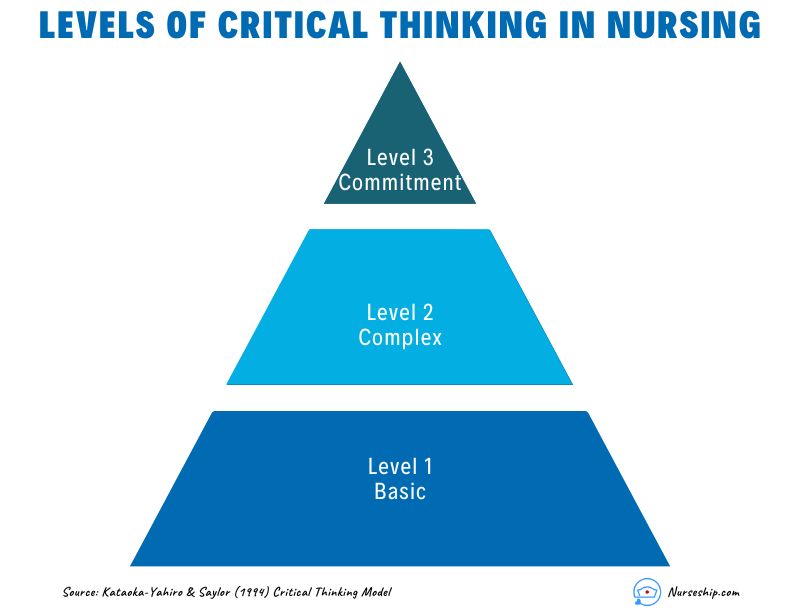
The development of critical thinking in nursing practice involves progressing through three levels: basic, complex, and commitment.
The Kataoka-Yahiro and Saylor model outlines this progression.
1. Basic Critical Thinking:
At this level, learners trust experts for solutions. Thinking is based on rules and principles. For instance, nursing students may strictly follow a procedure manual without personalization, as they lack experience. Answers are seen as right or wrong, and the opinions of experts are accepted.
2. Complex Critical Thinking:
Learners start to analyze choices independently and think creatively. They recognize conflicting solutions and weigh benefits and risks. Thinking becomes innovative, with a willingness to consider various approaches in complex situations.
3. Commitment:
At this level, individuals anticipate decision points without external help and take responsibility for their choices. They choose actions or beliefs based on available alternatives, considering consequences and accountability.
As nurses gain knowledge and experience, their critical thinking evolves from relying on experts to independent analysis and decision-making, ultimately leading to committed and accountable choices in patient care.
Why Critical Thinking is Important in Nursing?
Critical thinking is important in nursing for several crucial reasons:
Patient Safety:
Nursing decisions directly impact patient well-being. Critical thinking helps nurses identify potential risks, make informed choices, and prevent errors.
Clinical Judgment:
Nursing decisions often involve evaluating information from various sources, such as patient history, lab results, and medical literature.
Critical thinking assists nurses in critically appraising this information, distinguishing credible sources, and making rational judgments that align with evidence-based practices.
Enhances Decision-Making:
In nursing, critical thinking allows nurses to gather relevant patient information, assess it objectively, and weigh different options based on evidence and analysis.
This process empowers them to make informed decisions about patient care, treatment plans, and interventions, ultimately leading to better outcomes.
Promotes Problem-Solving:
Nurses encounter complex patient issues that require effective problem-solving.
Critical thinking equips them to break down problems into manageable parts, analyze root causes, and explore creative solutions that consider the unique needs of each patient.
Drives Creativity:
Nursing care is not always straightforward. Critical thinking encourages nurses to think creatively and explore innovative approaches to challenges, especially when standard protocols might not suffice for unique patient situations.
Fosters Effective Communication:
Communication is central to nursing. Critical thinking enables nurses to clearly express their thoughts, provide logical explanations for their decisions, and engage in meaningful dialogues with patients, families, and other healthcare professionals.
Aids Learning:
Nursing is a field of continuous learning. Critical thinking encourages nurses to engage in ongoing self-directed education, seeking out new knowledge, embracing new techniques, and staying current with the latest research and developments.
Improves Relationships:
Open-mindedness and empathy are essential in nursing relationships.
Critical thinking encourages nurses to consider diverse viewpoints, understand patients’ perspectives, and communicate compassionately, leading to stronger therapeutic relationships.
Empowers Independence:
Nursing often requires autonomous decision-making. Critical thinking empowers nurses to analyze situations independently, make judgments without undue influence, and take responsibility for their actions.
Facilitates Adaptability:
Healthcare environments are ever-changing. Critical thinking equips nurses with the ability to quickly assess new information, adjust care plans, and navigate unexpected situations while maintaining patient safety and well-being.
Strengthens Critical Analysis:
In the era of vast information, nurses must discern reliable data from misinformation.
Critical thinking helps them scrutinize sources, question assumptions, and make well-founded choices based on credible information.
How to Apply Critical Thinking in Nursing? (With Examples)
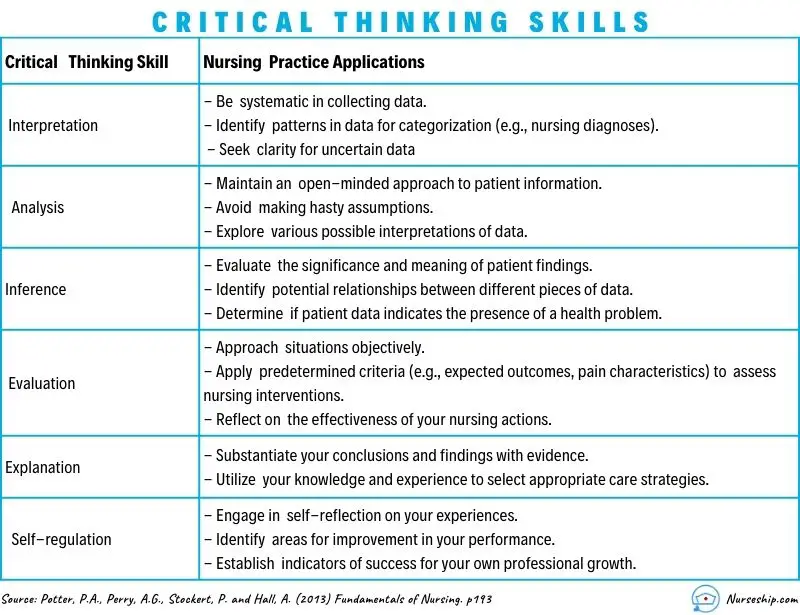
Here are some examples of how nurses can apply critical thinking.
Assess Patient Data:
Critical Thinking Action: Carefully review patient history, symptoms, and test results.
Example: A nurse notices a change in a diabetic patient’s blood sugar levels. Instead of just administering insulin, the nurse considers recent dietary changes, activity levels, and possible medication interactions before adjusting the treatment plan.
Diagnose Patient Needs:
Critical Thinking Action: Analyze patient data to identify potential nursing diagnoses.
Example: After reviewing a patient’s lab results, vital signs, and observations, a nurse identifies “ Risk for Impaired Skin Integrity ” due to the patient’s limited mobility.
Plan and Implement Care:
Critical Thinking Action: Develop a care plan based on patient needs and evidence-based practices.
Example: For a patient at risk of falls, the nurse plans interventions such as hourly rounding, non-slip footwear, and bed alarms to ensure patient safety.
Evaluate Interventions:
Critical Thinking Action: Assess the effectiveness of interventions and modify the care plan as needed.
Example: After administering pain medication, the nurse evaluates its impact on the patient’s comfort level and considers adjusting the dosage or trying an alternative pain management approach.
Prioritize Care:
Critical Thinking Action: Determine the order of interventions based on patient acuity and needs.
Example: In a busy emergency department, the nurse triages patients by considering the severity of their conditions, ensuring that critical cases receive immediate attention.
Collaborate with the Healthcare Team:
Critical Thinking Action: Participate in interdisciplinary discussions and share insights.
Example: During rounds, a nurse provides input on a patient’s response to treatment, which prompts the team to adjust the care plan for better outcomes.
Ethical Decision-Making:
Critical Thinking Action: Analyze ethical dilemmas and make morally sound choices.
Example: When a terminally ill patient expresses a desire to stop treatment, the nurse engages in ethical discussions, respecting the patient’s autonomy and ensuring proper end-of-life care.
Patient Education:
Critical Thinking Action: Tailor patient education to individual needs and comprehension levels.
Example: A nurse uses visual aids and simplified language to explain medication administration to a patient with limited literacy skills.
Adapt to Changes:
Critical Thinking Action: Quickly adjust care plans when patient conditions change.
Example: During post-operative recovery, a nurse notices signs of infection and promptly informs the healthcare team to initiate appropriate treatment adjustments.
Critical Analysis of Information:
Critical Thinking Action: Evaluate information sources for reliability and relevance.
Example: When presented with conflicting research studies, a nurse critically examines the methodologies and sample sizes to determine which study is more credible.
Making Sense of Critical Thinking Skills
What is the purpose of critical thinking in nursing.
The purpose of critical thinking in nursing is to enable nurses to effectively analyze, interpret, and evaluate patient information, make informed clinical judgments, develop appropriate care plans, prioritize interventions, and adapt their approaches as needed, thereby ensuring safe, evidence-based, and patient-centered care.
Why critical thinking is important in nursing?
Critical thinking is important in nursing because it promotes safe decision-making, accurate clinical judgment, problem-solving, evidence-based practice, holistic patient care, ethical reasoning, collaboration, and adapting to dynamic healthcare environments.
Critical thinking skill also enhances patient safety, improves outcomes, and supports nurses’ professional growth.
How is critical thinking used in the nursing process?
Critical thinking is integral to the nursing process as it guides nurses through the systematic approach of assessing, diagnosing, planning, implementing, and evaluating patient care. It involves:
- Assessment: Critical thinking enables nurses to gather and interpret patient data accurately, recognizing relevant patterns and cues.
- Diagnosis: Nurses use critical thinking to analyze patient data, identify nursing diagnoses, and differentiate actual issues from potential complications.
- Planning: Critical thinking helps nurses develop tailored care plans, selecting appropriate interventions based on patient needs and evidence.
- Implementation: Nurses make informed decisions during interventions, considering patient responses and adjusting plans as needed.
- Evaluation: Critical thinking supports the assessment of patient outcomes, determining the effectiveness of intervention, and adapting care accordingly.
Throughout the nursing process , critical thinking ensures comprehensive, patient-centered care and fosters continuous improvement in clinical judgment and decision-making.
What is an example of the critical thinking attitude of independent thinking in nursing practice?
An example of the critical thinking attitude of independent thinking in nursing practice could be:
A nurse is caring for a patient with a complex medical history who is experiencing a new set of symptoms. The nurse carefully reviews the patient’s history, recent test results, and medication list.
While discussing the case with the healthcare team, the nurse realizes that the current treatment plan might not be addressing all aspects of the patient’s condition.
Instead of simply following the established protocol, the nurse independently considers alternative approaches based on their assessment.
The nurse proposes a modification to the treatment plan, citing the rationale and evidence supporting the change.
This demonstrates independent thinking by critically evaluating the situation, challenging assumptions, and advocating for a more personalized and effective patient care approach.
How to use Costa’s level of questioning for critical thinking in nursing?
Costa’s levels of questioning can be applied in nursing to facilitate critical thinking and stimulate a deeper understanding of patient situations. The levels of questioning are as follows:
- 15 Attitudes of Critical Thinking in Nursing (Explained W/ Examples)
- Nursing Concept Map (FREE Template)
- Clinical Reasoning In Nursing (Explained W/ Example)
- 8 Stages Of The Clinical Reasoning Cycle
- How To Improve Critical Thinking Skills In Nursing? 24 Strategies With Examples
- What is the “5 Whys” Technique?
- What Are Socratic Questions?
Critical thinking in nursing is the foundation that underpins safe, effective, and patient-centered care.
Critical thinking skills empower nurses to navigate the complexities of their profession while consistently providing high-quality care to diverse patient populations.
Reading Recommendation
Potter, P.A., Perry, A.G., Stockert, P. and Hall, A. (2013) Fundamentals of Nursing
Comments are closed.
Medical & Legal Disclaimer
All the contents on this site are for entertainment, informational, educational, and example purposes ONLY. These contents are not intended to be used as a substitute for professional medical advice or practice guidelines. However, we aim to publish precise and current information. By using any content on this website, you agree never to hold us legally liable for damages, harm, loss, or misinformation. Read the privacy policy and terms and conditions.
Privacy Policy
Terms & Conditions
© 2024 nurseship.com. All rights reserved.

What is Critical Thinking in Nursing? (With Examples, Importance, & How to Improve)

Successful nursing requires learning several skills used to communicate with patients, families, and healthcare teams. One of the most essential skills nurses must develop is the ability to demonstrate critical thinking. If you are a nurse, perhaps you have asked if there is a way to know how to improve critical thinking in nursing? As you read this article, you will learn what critical thinking in nursing is and why it is important. You will also find 18 simple tips to improve critical thinking in nursing and sample scenarios about how to apply critical thinking in your nursing career.
What Is Critical Thinking In Nursing?
4 reasons why critical thinking is so important in nursing, 1. critical thinking skills will help you anticipate and understand changes in your patient’s condition., 2. with strong critical thinking skills, you can make decisions about patient care that is most favorable for the patient and intended outcomes., 3. strong critical thinking skills in nursing can contribute to innovative improvements and professional development., 4. critical thinking skills in nursing contribute to rational decision-making, which improves patient outcomes., what are the 8 important attributes of excellent critical thinking in nursing, 1. the ability to interpret information:, 2. independent thought:, 3. impartiality:, 4. intuition:, 5. problem solving:, 6. flexibility:, 7. perseverance:, 8. integrity:, examples of poor critical thinking vs excellent critical thinking in nursing, 1. scenario: patient/caregiver interactions, poor critical thinking:, excellent critical thinking:, 2. scenario: improving patient care quality, 3. scenario: interdisciplinary collaboration, 4. scenario: precepting nursing students and other nurses, how to improve critical thinking in nursing, 1. demonstrate open-mindedness., 2. practice self-awareness., 3. avoid judgment., 4. eliminate personal biases., 5. do not be afraid to ask questions., 6. find an experienced mentor., 7. join professional nursing organizations., 8. establish a routine of self-reflection., 9. utilize the chain of command., 10. determine the significance of data and decide if it is sufficient for decision-making., 11. volunteer for leadership positions or opportunities., 12. use previous facts and experiences to help develop stronger critical thinking skills in nursing., 13. establish priorities., 14. trust your knowledge and be confident in your abilities., 15. be curious about everything., 16. practice fair-mindedness., 17. learn the value of intellectual humility., 18. never stop learning., 4 consequences of poor critical thinking in nursing, 1. the most significant risk associated with poor critical thinking in nursing is inadequate patient care., 2. failure to recognize changes in patient status:, 3. lack of effective critical thinking in nursing can impact the cost of healthcare., 4. lack of critical thinking skills in nursing can cause a breakdown in communication within the interdisciplinary team., useful resources to improve critical thinking in nursing, youtube videos, my final thoughts, frequently asked questions answered by our expert, 1. will lack of critical thinking impact my nursing career, 2. usually, how long does it take for a nurse to improve their critical thinking skills, 3. do all types of nurses require excellent critical thinking skills, 4. how can i assess my critical thinking skills in nursing.
• Ask relevant questions • Justify opinions • Address and evaluate multiple points of view • Explain assumptions and reasons related to your choice of patient care options
5. Can I Be a Nurse If I Cannot Think Critically?

Critical Thinking in Nursing
- First Online: 02 January 2023
Cite this chapter

- Şefika Dilek Güven 3
Part of the book series: Integrated Science ((IS,volume 12))
1157 Accesses
Critical thinking is an integral part of nursing, especially in terms of professionalization and independent clinical decision-making. It is necessary to think critically to provide adequate, creative, and effective nursing care when making the right decisions for practices and care in the clinical setting and solving various ethical issues encountered. Nurses should develop their critical thinking skills so that they can analyze the problems of the current century, keep up with new developments and changes, cope with nursing problems they encounter, identify more complex patient care needs, provide more systematic care, give the most appropriate patient care in line with the education they have received, and make clinical decisions. The present chapter briefly examines critical thinking, how it relates to nursing, and which skills nurses need to develop as critical thinkers.
Graphical Abstract/Art Performance
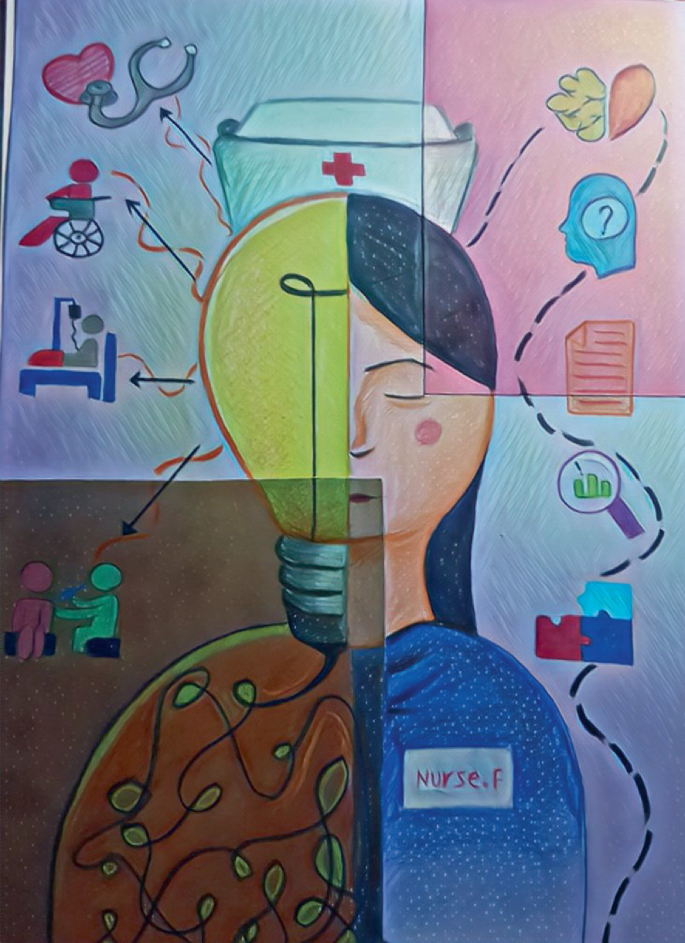
Critical thinking in nursing.
This painting shows a nurse and how she is thinking critically. On the right side are the stages of critical thinking and on the left side, there are challenges that a nurse might face. The entire background is also painted in several colors to represent a kind of intellectual puzzle. It is made using colored pencils and markers.
(Adapted with permission from the Association of Science and Art (ASA), Universal Scientific Education and Research Network (USERN); Painting by Mahshad Naserpour).
Unless the individuals of a nation thinkers, the masses can be drawn in any direction. Mustafa Kemal Atatürk
This is a preview of subscription content, log in via an institution to check access.
Access this chapter
- Available as PDF
- Read on any device
- Instant download
- Own it forever
- Available as EPUB and PDF
- Compact, lightweight edition
- Dispatched in 3 to 5 business days
- Free shipping worldwide - see info
- Durable hardcover edition
Tax calculation will be finalised at checkout
Purchases are for personal use only
Institutional subscriptions
Bilgiç Ş, Kurtuluş Tosun Z (2016) Birinci ve son sınıf hemşirelik öğrencilerinde eleştirel düşünme ve etkileyen faktörler. Sağlık Bilimleri ve Meslekleri Dergisi 3(1):39–47
Article Google Scholar
Kantek F, Yıldırım N (2019) The effects of nursing education on critical thinking of students: a meta-analysis. Florence Nightingale Hemşirelik Dergisi 27(1):17–25
Ennis R (1996) Critical thinking dispositions: their nature and assessability. Informal Logic 18(2):165–182
Riddell T (2007) Critical assumptions: thinking critically about critical thinking. J Nurs Educ 46(3):121–126
Cüceloğlu D (2001) İyi düşün doğru karar ver. Remzi Kitabevi, pp 242–284
Google Scholar
Kurnaz A (2019) Eleştirel düşünme öğretimi etkinlikleri Planlama-Uygulama ve Değerlendirme. Eğitim yayın evi, p 27
Doğanay A, Ünal F (2006) Eleştirel düşünmenin öğretimi. In: İçerik Türlerine Dayalı Öğretim. Ankara Nobel Yayınevi, pp 209–261
Scheffer B-K, Rubenfeld M-G (2000) A consensus statement on critical thinking in nursing. J Nurs Educ 39(8):352–359
Article CAS Google Scholar
Rubenfeld M-G, Scheffer B (2014) Critical thinking tactics for nurses. Jones & Bartlett Publishers, pp 5–6, 7, 19–20
Gobet F (2005) Chunking models of expertise: implications for education. Appl Cogn Psychol 19:183–204
Ay F-A (2008) Mesleki temel kavramlar. In: Temel hemşirelik: Kavramlar, ilkeler, uygulamalar. İstanbul Medikal Yayıncılık, pp 205–220
Birol L (2010) Hemşirelik bakımında sistematik yaklaşım. In: Hemşirelik süreci. Berke Ofset Matbaacılık, pp 35–45
Twibell R, Ryan M, Hermiz M (2005) Faculty perceptions of critical thinking in student clinical experiences. J Nurs Educ 44(2):71–79
The Importance of Critical Thinking in Nursing. 19 November 2018 by Carson-Newman University Online. https://onlinenursing.cn.edu/news/value-critical-thinking-nursing
Suzanne C, Smeltzer Brenda G, Bare Janice L, Cheever HK (2010) Definition of critical thinking, critical thinking process. Medical surgical nursing. Lippincott, Williams & Wilkins, pp 27–28
Profetto-McGrath J (2003) The relationship of critical thinking skills and critical thinking dispositions of baccalaureate nursing students. J Adv Nurs 43(6):569–577
Elaine S, Mary C (2002) Critical thinking in nursing education: literature review. Int J Nurs Pract 8(2):89–98
Brunt B-A (2005) Critical thinking in nursing: an integrated review. J Continuing Educ Nurs 36(2):60–67
Carter L-M, Rukholm E (2008) A study of critical thinking, teacher–student interaction, and discipline-specific writing in an online educational setting for registered nurses. J Continuing Educ Nurs 39(3):133–138
Daly W-M (2001) The development of an alternative method in the assessment of critical thinking as an outcome of nursing education. J Adv Nurs 36(1):120–130
Edwards S-L (2007) Critical thinking: a two-phase framework. Nurse Educ Pract 7(5):303–314
Rogal S-M, Young J (2008) Exploring critical thinking in critical care nursing education: a pilot study. J Continuing Educ Nurs 39(1):28–33
Worrell J-A, Profetto-McGrath J (2007) Critical thinking as an outcome of context-based learning among post RN students: a literature review. Nurse Educ Today 27(5):420–426
Morrall P, Goodman B (2013) Critical thinking, nurse education and universities: some thoughts on current issues and implications for nursing practice. Nurse Educ Today 33(9):935–937
Raymond-Seniuk C, Profetto-McGrath J (2011) Can one learn to think critically?—a philosophical exploration. Open Nurs J 5:45–51
Download references
Author information
Authors and affiliations.
Nevşehir Hacı Bektaş Veli University, Semra ve Vefa Küçük, Faculty of Health Sciences, Nursing Department, 2000 Evler Mah. Damat İbrahim Paşa Yerleşkesi, Nevşehir, Turkey
Şefika Dilek Güven
You can also search for this author in PubMed Google Scholar
Corresponding author
Correspondence to Şefika Dilek Güven .
Editor information
Editors and affiliations.
Universal Scientific Education and Research Network (USERN), Stockholm, Sweden
Nima Rezaei
Rights and permissions
Reprints and permissions

Copyright information
© 2023 The Author(s), under exclusive license to Springer Nature Switzerland AG
About this chapter
Güven, Ş.D. (2023). Critical Thinking in Nursing. In: Rezaei, N. (eds) Brain, Decision Making and Mental Health. Integrated Science, vol 12. Springer, Cham. https://doi.org/10.1007/978-3-031-15959-6_10
Download citation
DOI : https://doi.org/10.1007/978-3-031-15959-6_10
Published : 02 January 2023
Publisher Name : Springer, Cham
Print ISBN : 978-3-031-15958-9
Online ISBN : 978-3-031-15959-6
eBook Packages : Behavioral Science and Psychology Behavioral Science and Psychology (R0)
Share this chapter
Anyone you share the following link with will be able to read this content:
Sorry, a shareable link is not currently available for this article.
Provided by the Springer Nature SharedIt content-sharing initiative
- Publish with us
Policies and ethics
- Find a journal
- Track your research
The Value of Critical Thinking in Nursing

- How Nurses Use Critical Thinking
- How to Improve Critical Thinking
- Common Mistakes

Some experts describe a person’s ability to question belief systems, test previously held assumptions, and recognize ambiguity as evidence of critical thinking. Others identify specific skills that demonstrate critical thinking, such as the ability to identify problems and biases, infer and draw conclusions, and determine the relevance of information to a situation.
Nicholas McGowan, BSN, RN, CCRN, has been a critical care nurse for 10 years in neurological trauma nursing and cardiovascular and surgical intensive care. He defines critical thinking as “necessary for problem-solving and decision-making by healthcare providers. It is a process where people use a logical process to gather information and take purposeful action based on their evaluation.”
“This cognitive process is vital for excellent patient outcomes because it requires that nurses make clinical decisions utilizing a variety of different lenses, such as fairness, ethics, and evidence-based practice,” he says.
How Do Nurses Use Critical Thinking?
Successful nurses think beyond their assigned tasks to deliver excellent care for their patients. For example, a nurse might be tasked with changing a wound dressing, delivering medications, and monitoring vital signs during a shift. However, it requires critical thinking skills to understand how a difference in the wound may affect blood pressure and temperature and when those changes may require immediate medical intervention.
Nurses care for many patients during their shifts. Strong critical thinking skills are crucial when juggling various tasks so patient safety and care are not compromised.
Jenna Liphart Rhoads, Ph.D., RN, is a nurse educator with a clinical background in surgical-trauma adult critical care, where critical thinking and action were essential to the safety of her patients. She talks about examples of critical thinking in a healthcare environment, saying:
“Nurses must also critically think to determine which patient to see first, which medications to pass first, and the order in which to organize their day caring for patients. Patient conditions and environments are continually in flux, therefore nurses must constantly be evaluating and re-evaluating information they gather (assess) to keep their patients safe.”
The COVID-19 pandemic created hospital care situations where critical thinking was essential. It was expected of the nurses on the general floor and in intensive care units. Crystal Slaughter is an advanced practice nurse in the intensive care unit (ICU) and a nurse educator. She observed critical thinking throughout the pandemic as she watched intensive care nurses test the boundaries of previously held beliefs and master providing excellent care while preserving resources.
“Nurses are at the patient’s bedside and are often the first ones to detect issues. Then, the nurse needs to gather the appropriate subjective and objective data from the patient in order to frame a concise problem statement or question for the physician or advanced practice provider,” she explains.
Top 5 Ways Nurses Can Improve Critical Thinking Skills
We asked our experts for the top five strategies nurses can use to purposefully improve their critical thinking skills.
Case-Based Approach
Slaughter is a fan of the case-based approach to learning critical thinking skills.
In much the same way a detective would approach a mystery, she mentors her students to ask questions about the situation that help determine the information they have and the information they need. “What is going on? What information am I missing? Can I get that information? What does that information mean for the patient? How quickly do I need to act?”
Consider forming a group and working with a mentor who can guide you through case studies. This provides you with a learner-centered environment in which you can analyze data to reach conclusions and develop communication, analytical, and collaborative skills with your colleagues.
Practice Self-Reflection
Rhoads is an advocate for self-reflection. “Nurses should reflect upon what went well or did not go well in their workday and identify areas of improvement or situations in which they should have reached out for help.” Self-reflection is a form of personal analysis to observe and evaluate situations and how you responded.
This gives you the opportunity to discover mistakes you may have made and to establish new behavior patterns that may help you make better decisions. You likely already do this. For example, after a disagreement or contentious meeting, you may go over the conversation in your head and think about ways you could have responded.
It’s important to go through the decisions you made during your day and determine if you should have gotten more information before acting or if you could have asked better questions.
During self-reflection, you may try thinking about the problem in reverse. This may not give you an immediate answer, but can help you see the situation with fresh eyes and a new perspective. How would the outcome of the day be different if you planned the dressing change in reverse with the assumption you would find a wound infection? How does this information change your plan for the next dressing change?
Develop a Questioning Mind
McGowan has learned that “critical thinking is a self-driven process. It isn’t something that can simply be taught. Rather, it is something that you practice and cultivate with experience. To develop critical thinking skills, you have to be curious and inquisitive.”
To gain critical thinking skills, you must undergo a purposeful process of learning strategies and using them consistently so they become a habit. One of those strategies is developing a questioning mind. Meaningful questions lead to useful answers and are at the core of critical thinking .
However, learning to ask insightful questions is a skill you must develop. Faced with staff and nursing shortages , declining patient conditions, and a rising number of tasks to be completed, it may be difficult to do more than finish the task in front of you. Yet, questions drive active learning and train your brain to see the world differently and take nothing for granted.
It is easier to practice questioning in a non-stressful, quiet environment until it becomes a habit. Then, in the moment when your patient’s care depends on your ability to ask the right questions, you can be ready to rise to the occasion.
Practice Self-Awareness in the Moment
Critical thinking in nursing requires self-awareness and being present in the moment. During a hectic shift, it is easy to lose focus as you struggle to finish every task needed for your patients. Passing medication, changing dressings, and hanging intravenous lines all while trying to assess your patient’s mental and emotional status can affect your focus and how you manage stress as a nurse .
Staying present helps you to be proactive in your thinking and anticipate what might happen, such as bringing extra lubricant for a catheterization or extra gloves for a dressing change.
By staying present, you are also better able to practice active listening. This raises your assessment skills and gives you more information as a basis for your interventions and decisions.
Use a Process
As you are developing critical thinking skills, it can be helpful to use a process. For example:
- Ask questions.
- Gather information.
- Implement a strategy.
- Evaluate the results.
- Consider another point of view.
These are the fundamental steps of the nursing process (assess, diagnose, plan, implement, evaluate). The last step will help you overcome one of the common problems of critical thinking in nursing — personal bias.
Common Critical Thinking Pitfalls in Nursing
Your brain uses a set of processes to make inferences about what’s happening around you. In some cases, your unreliable biases can lead you down the wrong path. McGowan places personal biases at the top of his list of common pitfalls to critical thinking in nursing.
“We all form biases based on our own experiences. However, nurses have to learn to separate their own biases from each patient encounter to avoid making false assumptions that may interfere with their care,” he says. Successful critical thinkers accept they have personal biases and learn to look out for them. Awareness of your biases is the first step to understanding if your personal bias is contributing to the wrong decision.
New nurses may be overwhelmed by the transition from academics to clinical practice, leading to a task-oriented mindset and a common new nurse mistake ; this conflicts with critical thinking skills.
“Consider a patient whose blood pressure is low but who also needs to take a blood pressure medication at a scheduled time. A task-oriented nurse may provide the medication without regard for the patient’s blood pressure because medication administration is a task that must be completed,” Slaughter says. “A nurse employing critical thinking skills would address the low blood pressure, review the patient’s blood pressure history and trends, and potentially call the physician to discuss whether medication should be withheld.”
Fear and pride may also stand in the way of developing critical thinking skills. Your belief system and worldview provide comfort and guidance, but this can impede your judgment when you are faced with an individual whose belief system or cultural practices are not the same as yours. Fear or pride may prevent you from pursuing a line of questioning that would benefit the patient. Nurses with strong critical thinking skills exhibit:
- Learn from their mistakes and the mistakes of other nurses
- Look forward to integrating changes that improve patient care
- Treat each patient interaction as a part of a whole
- Evaluate new events based on past knowledge and adjust decision-making as needed
- Solve problems with their colleagues
- Are self-confident
- Acknowledge biases and seek to ensure these do not impact patient care
An Essential Skill for All Nurses
Critical thinking in nursing protects patient health and contributes to professional development and career advancement. Administrative and clinical nursing leaders are required to have strong critical thinking skills to be successful in their positions.
By using the strategies in this guide during your daily life and in your nursing role, you can intentionally improve your critical thinking abilities and be rewarded with better patient outcomes and potential career advancement.
Frequently Asked Questions About Critical Thinking in Nursing
How are critical thinking skills utilized in nursing practice.
Nursing practice utilizes critical thinking skills to provide the best care for patients. Often, the patient’s cause of pain or health issue is not immediately clear. Nursing professionals need to use their knowledge to determine what might be causing distress, collect vital information, and make quick decisions on how best to handle the situation.
How does nursing school develop critical thinking skills?
Nursing school gives students the knowledge professional nurses use to make important healthcare decisions for their patients. Students learn about diseases, anatomy, and physiology, and how to improve the patient’s overall well-being. Learners also participate in supervised clinical experiences, where they practice using their critical thinking skills to make decisions in professional settings.
Do only nurse managers use critical thinking?
Nurse managers certainly use critical thinking skills in their daily duties. But when working in a health setting, anyone giving care to patients uses their critical thinking skills. Everyone — including licensed practical nurses, registered nurses, and advanced nurse practitioners —needs to flex their critical thinking skills to make potentially life-saving decisions.
Meet Our Contributors

Crystal Slaughter, DNP, APRN, ACNS-BC, CNE
Crystal Slaughter is a core faculty member in Walden University’s RN-to-BSN program. She has worked as an advanced practice registered nurse with an intensivist/pulmonary service to provide care to hospitalized ICU patients and in inpatient palliative care. Slaughter’s clinical interests lie in nursing education and evidence-based practice initiatives to promote improving patient care.

Jenna Liphart Rhoads, Ph.D., RN
Jenna Liphart Rhoads is a nurse educator and freelance author and editor. She earned a BSN from Saint Francis Medical Center College of Nursing and an MS in nursing education from Northern Illinois University. Rhoads earned a Ph.D. in education with a concentration in nursing education from Capella University where she researched the moderation effects of emotional intelligence on the relationship of stress and GPA in military veteran nursing students. Her clinical background includes surgical-trauma adult critical care, interventional radiology procedures, and conscious sedation in adult and pediatric populations.

Nicholas McGowan, BSN, RN, CCRN
Nicholas McGowan is a critical care nurse with 10 years of experience in cardiovascular, surgical intensive care, and neurological trauma nursing. McGowan also has a background in education, leadership, and public speaking. He is an online learner who builds on his foundation of critical care nursing, which he uses directly at the bedside where he still practices. In addition, McGowan hosts an online course at Critical Care Academy where he helps nurses achieve critical care (CCRN) certification.
A consensus statement on critical thinking in nursing
Affiliation.
- 1 Department of Nursing Education, Eastern Michigan University, Ypsilanti 48197, USA.
- PMID: 11103973
- DOI: 10.3928/0148-4834-20001101-06
The purpose of this study was to define critical thinking in nursing. A Delphi technique with 5 rounds of input was used to achieve this purpose. An international panel of expert nurses from nine countries: Brazil, Canada, England, Iceland, Japan, Korea, Netherlands, Thailand, and 23 states in the U.S. participated in this study between 1995 and 1998. A consensus definition (statement) of critical thinking in nursing was achieved. The panel also identified and defined 10 habits of the mind (affective components) and 7 skills (cognitive components) of critical thinking in nursing. The habits of the mind of critical thinking in nursing included: confidence, contextual perspective, creativity, flexibility, inquisitiveness, intellectual integrity, intuition, open-mindedness, perseverance, and reflection. Skills of critical thinking in nursing included: analyzing, applying standards, discriminating, information seeking, logical reasoning, predicting and transforming knowledge. These findings can be used by practitioners, educators and researchers to advance understanding of the essential role of critical thinking in nursing.
Publication types
- Research Support, Non-U.S. Gov't
- Asia, Eastern
- Consensus Development Conferences as Topic
- Delphi Technique
- Exploratory Behavior
- Models, Nursing
- North America
- Nursing Evaluation Research
- Nursing Process / standards*
- Practice Guidelines as Topic* / standards*
- Problem Solving
- Professional Competence / standards*
We use cookies on our website to support technical features that enhance your user experience, and to help us improve our website. By continuing to use this website, you accept our privacy policy .
- Student Login
- No-Cost Professional Certificates
- Call Us: 888-549-6755
- 888-559-6763
- Search site Search our site Search Now Close
- Request Info
Skip to Content (Press Enter)
Why Critical Thinking Skills in Nursing Matter (And What You Can Do to Develop Them)
By Hannah Meinke on 07/05/2021
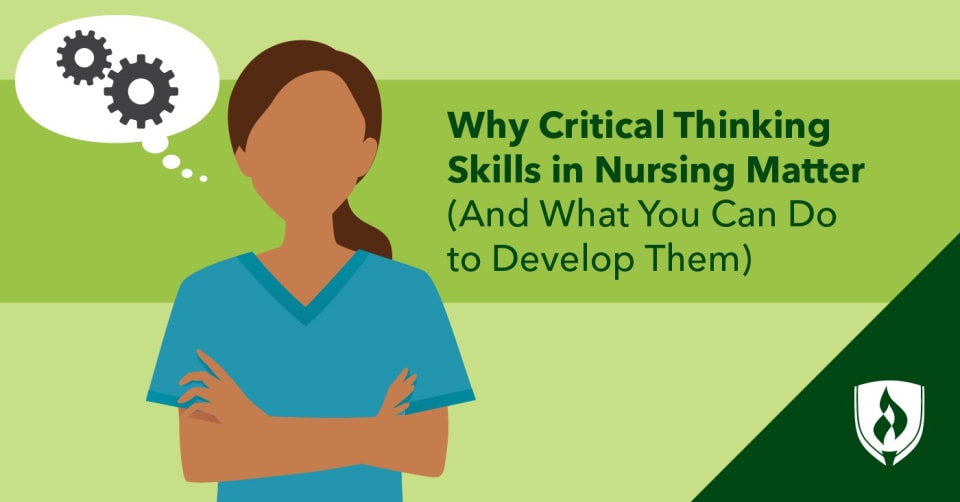
The nursing profession tends to attract those who have natural nurturing abilities, a desire to help others, and a knack for science or anatomy. But there is another important skill that successful nurses share, and it's often overlooked: the ability to think critically.
Identifying a problem, determining the best solution and choosing the most effective method to solve the program are all parts of the critical thinking process. After executing the plan, critical thinkers reflect on the situation to figure out if it was effective and if it could have been done better. As you can see, critical thinking is a transferable skill that can be leveraged in several facets of your life.
But why is it so important for nurses to use? We spoke with several experts to learn why critical thinking skills in nursing are so crucial to the field, the patients and the success of a nurse. Keep reading to learn why and to see how you can improve this skill.
Why are critical thinking skills in nursing important?
You learn all sorts of practical skills in nursing school, like flawlessly dressing a wound, taking vitals like a pro or starting an IV without flinching. But without the ability to think clearly and make rational decisions, those skills alone won’t get you very far—you need to think critically as well.
“Nurses are faced with decision-making situations in patient care, and each decision they make impacts patient outcomes. Nursing critical thinking skills drive the decision-making process and impact the quality of care provided,” says Georgia Vest, DNP, RN and senior dean of nursing at the Rasmussen University School of Nursing.
For example, nurses often have to make triage decisions in the emergency room. With an overflow of patients and limited staff, they must evaluate which patients should be treated first. While they rely on their training to measure vital signs and level of consciousness, they must use critical thinking to analyze the consequences of delaying treatment in each case.
No matter which department they work in, nurses use critical thinking in their everyday routines. When you’re faced with decisions that could ultimately mean life or death, the ability to analyze a situation and come to a solution separates the good nurses from the great ones.
How are critical thinking skills acquired in nursing school?
Nursing school offers a multitude of material to master and upholds high expectations for your performance. But in order to learn in a way that will actually equip you to become an excellent nurse, you have to go beyond just memorizing terms. You need to apply an analytical mindset to understanding course material.
One way for students to begin implementing critical thinking is by applying the nursing process to their line of thought, according to Vest. The process includes five steps: assessment, diagnosis, outcomes/planning, implementation and evaluation.
“One of the fundamental principles for developing critical thinking is the nursing process,” Vest says. “It needs to be a lived experience in the learning environment.”
Nursing students often find that there are multiple correct solutions to a problem. The key to nursing is to select the “the most correct” solution—one that will be the most efficient and best fit for that particular situation. Using the nursing process, students can narrow down their options to select the best one.
When answering questions in class or on exams, challenge yourself to go beyond simply selecting an answer. Start to think about why that answer is correct and what the possible consequences might be. Simply memorizing the material won’t translate well into a real-life nursing setting.
How can you develop your critical thinking skills as a nurse?
As you know, learning doesn’t stop with graduation from nursing school. Good nurses continue to soak up knowledge and continually improve throughout their careers. Likewise, they can continue to build their critical thinking skills in the workplace with each shift.
“To improve your critical thinking, pick the brains of the experienced nurses around you to help you get the mindset,” suggests Eileen Sollars, RN ADN, AAS. Understanding how a seasoned nurse came to a conclusion will provide you with insights you may not have considered and help you develop your own approach.
The chain of command can also help nurses develop critical thinking skills in the workplace.
“Another aid in the development of critical thinking I cannot stress enough is the utilization of the chain of command,” Vest says. “In the chain of command, the nurse always reports up to the nurse manager and down to the patient care aide. Peers and fellow healthcare professionals are not in the chain of command. Clear understanding and proper utilization of the chain of command is essential in the workplace.”
How are critical thinking skills applied in nursing?
“Nurses use critical thinking in every single shift,” Sollars says. “Critical thinking in nursing is a paramount skill necessary in the care of your patients. Nowadays there is more emphasis on machines and technical aspects of nursing, but critical thinking plays an important role. You need it to understand and anticipate changes in your patient's condition.”
As a nurse, you will inevitably encounter a situation in which there are multiple solutions or treatments, and you'll be tasked with determining the solution that will provide the best possible outcome for your patient. You must be able to quickly and confidently assess situations and make the best care decision in each unique scenario. It is in situations like these that your critical thinking skills will direct your decision-making.
Do critical thinking skills matter more for nursing leadership and management positions?
While critical thinking skills are essential at every level of nursing, leadership and management positions require a new level of this ability.
When it comes to managing other nurses, working with hospital administration, and dealing with budgets, schedules or policies, critical thinking can make the difference between a smooth-running or struggling department. At the leadership level, nurses need to see the big picture and understand how each part works together.
A nurse manager , for example, might have to deal with being short-staffed. This could require coaching nurses on how to prioritize their workload, organize their tasks and rely on strategies to keep from burning out. A lead nurse with strong critical thinking skills knows how to fully understand the problem and all its implications.
- How will patient care be affected by having fewer staff?
- What kind of strain will be on the nurses?
Their solutions will take into account all their resources and possible roadblocks.
- What work can be delegated to nursing aids?
- Are there any nurses willing to come in on their day off?
- Are nurses from other departments available to provide coverage?
They’ll weigh the pros and cons of each solution and choose those with the greatest potential.
- Will calling in an off-duty nurse contribute to burnout?
- Was this situation a one-off occurrence or something that could require an additional hire in the long term?
Finally, they will look back on the issue and evaluate what worked and what didn’t. With critical thinking skills like this, a lead nurse can affect their entire staff, patient population and department for the better.
Beyond thinking
You’re now well aware of the importance of critical thinking skills in nursing. Even if you already use critical thinking skills every day, you can still work toward strengthening that skill. The more you practice it, the better you will become and the more naturally it will come to you.
If you’re interested in critical thinking because you’d like to move up in your current nursing job, consider how a Bachelor of Science in Nursing (BSN) could help you develop the necessary leadership skills.
EDITOR’S NOTE: This article was originally published in July 2012. It has since been updated to include information relevant to 2021.
- Share on Facebook
- Share on Twitter
- Share on Pinterest
- Share on LinkedIn
Request More Information
Talk with an admissions advisor today. Fill out the form to receive information about:
- Program Details and Applying for Classes
- Financial Aid and FAFSA (for those who qualify)
- Customized Support Services
- Detailed Program Plan
There are some errors in the form. Please correct the errors and submit again.
Please enter your first name.
Please enter your last name.
There is an error in email. Make sure your answer has:
- An "@" symbol
- A suffix such as ".com", ".edu", etc.
There is an error in phone number. Make sure your answer has:
- 10 digits with no dashes or spaces
- No country code (e.g. "1" for USA)
There is an error in ZIP code. Make sure your answer has only 5 digits.
Please choose a School of study.
Please choose a program.
Please choose a degree.
The program you have selected is not available in your ZIP code. Please select another program or contact an Admissions Advisor (877.530.9600) for help.
The program you have selected requires a nursing license. Please select another program or contact an Admissions Advisor (877.530.9600) for help.
Rasmussen University is not enrolling students in your state at this time.
By selecting "Submit," I authorize Rasmussen University to contact me by email, phone or text message at the number provided. There is no obligation to enroll. This site is protected by reCAPTCHA and the Google Privacy Policy and Terms of Service apply.
About the author
Hannah Meinke

Posted in General Nursing
- nursing education
Related Content

Brianna Flavin | 05.07.2024

Brianna Flavin | 03.19.2024

Robbie Gould | 11.14.2023

Noelle Hartt | 11.09.2023
This piece of ad content was created by Rasmussen University to support its educational programs. Rasmussen University may not prepare students for all positions featured within this content. Please visit www.rasmussen.edu/degrees for a list of programs offered. External links provided on rasmussen.edu are for reference only. Rasmussen University does not guarantee, approve, control, or specifically endorse the information or products available on websites linked to, and is not endorsed by website owners, authors and/or organizations referenced. Rasmussen University is accredited by the Higher Learning Commission, an institutional accreditation agency recognized by the U.S. Department of Education.
An official website of the United States government
The .gov means it’s official. Federal government websites often end in .gov or .mil. Before sharing sensitive information, make sure you’re on a federal government site.
The site is secure. The https:// ensures that you are connecting to the official website and that any information you provide is encrypted and transmitted securely.
- Publications
- Account settings
Preview improvements coming to the PMC website in October 2024. Learn More or Try it out now .
- Advanced Search
- Journal List
- Nurs Midwifery Stud
- v.4(1); 2015 Mar

Critical Thinking Skills in Nursing Students: a Comparison Between Freshmen and Senior Students
Ismail azizi-fini.
1 School of Nursing and Midwifery, Tehran University of Medical Sciences, Tehran, IR Iran
Ali Hajibagheri
2 Department of Medical Surgical Nursing, Faculty of Nursing and Midwifery, Kashan University of Medical Sciences, Kashan, IR Iran
Mohsen Adib-Hajbaghery
3 Trauma Nursing Research Center, Kashan University of Medical Sciences, Kashan, IR Iran
Background:
Critical thinking is one of the most important concepts in the field of education. Despite studies published on nursing students’ critical thinking skills (CTS), some suggest that there is not enough evidence supporting the relationship between content of nursing education programs and nursing students’ CTS.
Objectives:
Given the existing discrepancies, this study aimed to compare the critical thinking skills of freshmen and senior nursing students.
Patients and Methods:
This comparative study was conducted on 150 undergraduate freshmen and senior nursing students in Kashan University of Medical Sciences, during 2012. The students in the first and the last semesters of their study in nursing were entered in the study using the census method. Data were collected using a questionnaire including questions on demographic data and the California Critical Thinking Skills Test, form B. Data analysis was performed using the SPSS v.13 software. Descriptive statistics were calculated. Moreover, independent sample t-test and Spearman and Pearson’s correlation coefficients were used in the data analysis.
Both the freshmen and senior nursing students had low CTS. The mean critical thinking scores were 11.79 ± 4.80 and 11.21 ± 3.17 for the freshmen and the senior students, respectively (P = 0.511). Moreover, no significant correlation was found between the students’ score in CTS and their age, gender, high school grade point average (GPA), rank in university entrance examination (RUEE) and interest in the nursing profession.
Conclusions:
The students were low skilled in critical thinking and their CTS did not significantly change during their nursing degree. Thus it may be concluded that the nursing education program did not affect the CTS of its students. Longitudinal studies are suggested for assessing nursing students’ critical thinking over time. Moreover, revising the curriculum and preparing nursing educators for implementing innovative and active teaching strategies are suggested.
1. Background
Critical thinking is one of the most important concepts involved in the field of education. Enabling students to think critically is not only a primary purpose of higher education, but also facilitates the dynamics of academies and universities and helps them survive, develop and promotes scientific societies ( 1 ).
Introducing the concept of critical thinking into nursing education is a turning point in the process of professionalization. Despite different definitions for critical thinking, no consensus has yet been reached ( 2 , 3 ). However, critical thinking is generally defined as "a process of purposeful, interactive reasoning, criticism and judgment about what we believe and do" ( 4 ). Some have also defined critical thinking in nursing as "the process of reflective and reasonable thinking about nursing problems without a single solution and is focused on deciding what to believe and do" ( 5 ).
In the recent decades, as a result of the rapid advances in knowledge and technology, dramatic changes have occurred in healthcare organizations. Consequently, people’s demand has been increased for higher quality healthcare services, with lower costs and shorter length of hospital stay. Moreover, the aging population, complex disease processes and increased patients’ awareness, have evolved modern nursing. Thus, nurses are in need to continually improve their knowledge and competencies, to be able to provide safe and quality care in a context of constantly changing clinical situations ( 6 ).
In this changing environment, nurses need to develop their thinking and reasoning skills in order to meet the patients and families’ caring needs in collaboration with other healthcare professionals ( 7 ). Nurses as healthcare providers should be creative, self-directed and critical thinkers to be able to make appropriate decisions and solve clinical problems ( 8 ).
Karadag et al. investigated nurse educators and clinical nurses’ attitudes towards critical thinking and reported that both nurses and nurse educators believed in the crucial role of critical thinking skills (CTS) in the context of increasing complexity in modern healthcare ( 9 ). Simpson et al. also stressed that nurses should be skilled in reasoning and critical thinking to be able to appraise new knowledge. Highlighting the vital importance of CTS, the American Nurse Association also emphasizes that the nurses’ CTS should be measured as a criterion for validating outcomes of nurse education programs ( 6 ).
Several nursing authors have written about teaching methods used to strengthen CTS ( 4 ). According to Alfaro-LeFevre ( 10 ), there are at least two main reasons for nurses to learn CTS. Firstly, thinking is the key for problem solving; while, nurses without such skills are themselves part of the problem. Secondly, in critical situations, nurses should be able to take major decisions, independently and quickly. Critical thinking skills enable them to identify necessary data and distinguish problems requiring immediate intervention from those that are not life threatening. Thus, they will be able to consider the possible consequences of each action and make the right decision ( 3 ).
Bakalis et al. suggest that it is essential to establish a dialogue between teachers and students to promote CTS among learners ( 11 ). Studies have also shown a link between the students’ level of CTS and their level of academic education, age and clinical experience ( 4 , 12 ).
Despite many studies published on nurses and nursing students’ CTS, Duchscher suggests that there is no strong evidence supporting the relationship between content of nursing education programs and the nurses or nursing students’ CTS ( 12 ). Some other authors believe that there is a lack of appropriate tools for assessing nurse's CTS ( 13 , 14 ). However, Magnussen et al. ( 15 ) have reported that traditional teaching methods may hinder the ability of critical thinking while research-based learning, as a teaching method, can increase CTS.
Studies in Iran have shown mixed results in terms of nursing students’ critical thinking. Two studies by Rezaei et al. ( 16 ) and Eslami et al. ( 3 ) reported that nursing students had poor CTS. They found no significant difference between the levels of CTS in freshmen and senior nursing students. However, in two other studies, Khalili et al. ( 17 ) and McCarthy et al. ( 18 ) reported that the levels of CTS were significantly higher among senior compared to junior nursing students. Therefore, the question is whether CTS differs among nursing students at the start and the end of their nursing studies. The answer of this question would not only be important globally but also at the national level because this answer might help us evaluate the nursing curriculum and nursing educators as the main role models in the process of nursing education.
2. Objectives
Given the importance of CTS in nursing, and discrepancies in previous studies, this study aimed to compare the CTS of freshmen and senior nursing students of Kashan University of Medical Sciences (KAUMS), during year 2012.
3. Patients and Methods
A comparative study was conducted on 150 undergraduate freshmen and senior nursing students at KAUMS. All nursing students in the first and the last semester of their nursing program were entered in this study using the census method. Exclusion criteria were: being a guest student or being transferred from other universities, having an additional academic degree, and having passed some courses on critical thinking.
Data were collected using a two-part questionnaire. The first part of the questionnaire consisted of questions on demographic data (i.e. gender, age, the students’ high school grade point average (GPA), the students’ rank in university entrance examination (RUEE), and interest in the nursing profession). The second part of the questionnaire was the California Critical Thinking Skills Test, form B (CCTS form B). The CCTS form B is frequently used to assess the students' CTS ( 3 ). This scale consists of 34 questions, each with options, which are designed to evaluate critical thinking at the post-secondary level.
The CCTS form B was specifically designed to assess CTS in five areas of interpretation, analysis, evaluation, inductive reasoning and deductive reasoning. Each question is scored either one or zero for each correct or wrong answer, respectively. Thus, the lowest overall score is zero and the highest is 34 ( 19 ). The time each student spent to respond to the questionnaire was about 45 minutes.
The CCTS form B was previously translated to the Persian language by Akhoundzadeh et al. ( 20 ), and showed appropriate psychometric properties. They also confirmed the instrument’s content validity and reliability using the Kuder-Richardson coefficient, which was 0.62. The test was able to distinguish between CTS of nursing and philosophy students ( 21 ).
After obtaining permission from the authorities of the university, the instrument was passed to selected students in their breaks between classes. All students were asked to respond to the questionnaires in a private environment and returned their answers back to the researchers (the first or the second authors of this manuscript) or the secretary of the nursing department on the same day.
3.1. Ethical Considerations
Permission for this study was through the ethics committee of KAUMS. Other ethical issues in this study involved the assurance of confidentiality and anonymity of the participants. All participants were informed about the purpose and design of this research, and that their participation was voluntary. Participants signed a written informed consent for their participation.
3.2. Data Analysis
Data analysis was performed using the SPSS v.13 software. Descriptive statistics were calculated. Independent sample t-test was used to examine significant differences between mean quantitative variables of the two groups. Moreover, the Spearman and Pearson’s correlation coefficients were used to examine the correlation between the students’ scores in CTS and their age, gender, high school GPA, RUEE and interest in the nursing profession. The level of significance was considered less than 0.05.
Among all participants, 24.6% (n = 37) were freshmen and 75.4% (n = 113) were senior students. In total, 65.5% of the freshmen students and 65.3% of the seniors were females (P > 0.05). The mean age of the students was 20.5 ± 1.73 years and 22.41 ± 1.51 years, for freshmen and senior students, respectively (P > 0.05). The mean high school grade point averages of the students were 17.58 ± 1.65 and 18.38 ± 1.03 for the freshmen and seniors, respectively, (P > 0.05). The students’ mean ranks in the university entrance examination were 5186.6 and 6283.1 for the freshmen and seniors, respectively, (P > 0.05). Overall, 10.8% of freshmen students reported that they are very interested in the nursing profession, while 10.8% and 78.4% were moderately interested in or uninterested in the profession, respectively. In terms of senior students, 27.4% were very interested in the nursing profession, while 61.1% and 11.5% were moderately interested or uninterested in the profession, respectively.
The mean critical thinking scores were 11.79 ± 4.80 and 11.21 ± 3.17 for freshmen and senior students, respectively (P = 0.511). As shown in Table 1 , no significant differences were found between freshmen and senior students in terms of their mean scores for the interpretation, analysis, evaluation, inductive reasoning and deductive reasoning subscales. Both freshmen and senior students obtained the highest and the lowest mean scores in deductive reasoning and analysis subscales, respectively.
a All values are presented as Mean ± SD.
Using Pearson’s correlation coefficient, no significant correlation was found between the students’ CTS scores and their age, high school GPA, and RUEE ( Table 2 ). Moreover, using Spearman’s correlation coefficient, no significant correlation was found between the students’ CTS score and their gender and interest in the nursing profession ( Table 2 ).
5. Discussion
This study aimed to compare the CTS of freshmen and senior nursing students to determine if the current nursing education program is effective on its students CTS. Results showed that the mean critical thinking scores of freshmen and senior nursing students were at a low level. Moreover, no significant difference was observed between the mean critical thinking scores of freshmen and senior nursing students. In addition, no significant association was found between the students’ scores in CTS and variables such as gender, high school GPA, RUEE and level of interest in the nursing profession. These findings are consistent with the results of previous studies ( 22 ). Previous studies on the assessment of Iranian nursing students and nurses’ CTS have reported that the majority of nursing students and nurses in Iran have poor CTS ( 3 , 23 - 25 ). Consistent with this study, other studies have also found no significant difference between freshmen and senior nursing students' CTS ( 3 , 26 ). However, Khalili et al. ( 17 ), Babamohamadi and Khalili ( 23 ) have reported significant differences between the critical thinking scores of freshmen and senior nursing students, which is not in line with the results of the present study. These inconsistencies might not only be attributed to probable differences in learning styles of students ( 27 ) but also to the relatively different teaching styles of different nursing schools.
The results of this study showed no statistically significant positive correlations between demographic data and CTS. While Zhang and Lambert ( 27 ) and Noohi et al. ( 28 ) reported that a number of positive and negative correlations exist between demographic data and critical thinking skills. The lack of correlation between demographic data and CTS in the present study might be attributed to the characteristics of universities and their students; Mahmoodabad et al. ( 29 ), in a study from Iran, reported that students attending larger universities are somewhat different considering their GPA and RUEE, and this may affect their CTS. Another probably reason is that many of the senior students in Kashan are employed as part time nurses in healthcare centers. Therefore, as Bittencourt and Crossetti ( 30 ) have reported, students that work part time have less time to spend on intellectual activities. It seems that when students are employed in clinical settings, they spend more time in performing nursing techniques and following the routines instead of using the scientific knowledge they learned at the university. Working according to the routines usually does not need much thinking skills, and nurses simply follow the doctors’ orders. Working in this manner, would gradually affect the nurses cognitive, critical thinking and humanistic skills such as communication skills.
Furthermore, studies have reported that not only the content of education but also the teaching-learning methods at all levels of the education system in Iran (i.e. elementary, secondary and university) basically concentrate on transferring theoretical knowledge and do not focus on development of critical thinking and problem-solving skills in learners (4). Amini et al. ( 31 ) reported that this is a global problem in nursing education, and several studies indicate a lack of critical thinking and problem solving skills in undergraduate nursing programs. It has also been reported that although basic skills of critical thinking are taught to nursing students, they cannot apply them in solving problems they commonly encounter, and this may be considered as a sign of failure in nursing education systems ( 32 ). Moreover, overuse of lectures and multiple choice questions, and overlooking the nursing process in education may be among other possible reasons for the lack of CTS in Iranian nursing students ( 23 , 33 ).
It seems that nursing students have less opportunity to apply CTS in clinical settings. While techniques, such as questioning, Socratic method, learning in small groups, discussions and debates, writing diaries, problem based teaching and learning, use of case studies and other types of participative learning, have been shown to be effective in developing CTS ( 20 , 34 ). Previous studies have shown that the nursing curriculum in Iran contains a considerable amount of theoretical, redundant, unnecessary and inapplicable knowledge and nurse educators are under pressure to teach a large content in a limited time ( 4 , 35 ). Thus, making a balance between the course content and time available may be the first step in preparing the context for educators to assign more time for the development of the students’ CTS. Moreover, as Moattari et al. ( 35 ) reported, nurse educators should be prepared to implement active, student-centered, collaborative and problem-focused teaching strategies to foster the students’ CTS.
The results showed that nursing students had low CTS and these skills did not significantly change during their studies in nursing. Therefore, it may be concluded that the studied nursing education program did not affect its students’ CTS. However, the low critical thinking scores of the participants in the present study and other studies conducted in Iran may be attributed to the instruments used by these studies. Most of these studies used instruments such as CCTS Form B, and as mentioned previously, some nursing researchers believe that this instrument is not appropriate for assessing nurses or nursing students’ CTS. Thus, appropriate indigenous instruments should be developed for assessment of critical thinking in nurses. In addition, we tested our participants only one time. It is better to evaluate the evolution of critical thinking over time. Longitudinal studies are suggested for assessing the nursing students’ critical thinking over time. Moreover, revising the curriculum and preparing nurse educators for implementation of innovative and active teaching strategies are suggested. Then, the effects of such interventions can be assessed.
Acknowledgments
The researchers would like to express their gratitude to all the participants who were involved in this study.
Authors’ Contributions: All authors contributed equally in this study.
Funding/Support: This project was funded by the research deputy of Kashan University of Medical Sciences (grant No. 9017).
Translate this page from English...
*Machine translated pages not guaranteed for accuracy. Click Here for our professional translations.
Defining Critical Thinking

IMAGES
VIDEO
COMMENTS
Critical thinking in nursing is invaluable for safe, effective, patient-centered care. You can successfully navigate challenges in the ever-changing health care environment by continually developing and applying these skills. Images sourced from Getty Images. Critical thinking in nursing is essential to providing high-quality patient care.
The levels of critical thinking among clinical nurses were moderate or high. Regarding the antecedents of critical thinking, the influence of sociodemographic variables on critical thinking was inconsistent, with the exception that levels of critical thinking differed according to years of work experience. ... Nursing Critical Thinking in ...
The development of critical thinking in nursing practice involves progressing through three levels: basic, complex, and commitment. The Kataoka-Yahiro and Saylor model outlines this progression. 1. Basic Critical Thinking: At this level, learners trust experts for solutions. Thinking is based on rules and principles.
The following are examples of attributes of excellent critical thinking skills in nursing. 1. The ability to interpret information: In nursing, the interpretation of patient data is an essential part of critical thinking. Nurses must determine the significance of vital signs, lab values, and data associated with physical assessment.
Critical thinking is an integral part of nursing, especially in terms of professionalization and independent clinical decision-making. It is necessary to think critically to provide adequate, creative, and effective nursing care when making the right decisions for practices and care in the clinical setting and solving various ethical issues ...
In Brief. After a brief interaction with a nursing student, this nurse educator saw the wisdom of using critical thinking when teaching critical thinking. IN NURSING SCHOOL, I learned about two types of thinking: There is the regular kind, and then there is critical thinking. Although it sounds like it means thinking about important things ...
Critical thinking is a complex, dynamic process formed by attitudes and strategic skills, with the aim of achieving a specific goal or objective. The attitudes, including the critical thinking attitudes, constitute an important part of the idea of good care, of the good professional. It could be said that they become a virtue of the nursing ...
Critical thinking is applied by nurses in the process of solving problems of patients and decision-making process with creativity to enhance the effect. It is an essential process for a safe, efficient and skillful nursing intervention. Critical thinking according to Scriven and Paul is the mental active process and subtle perception, analysis ...
Critical Thinking in Nursing. ... As mentioned previously, even if nurse educators can demonstrate a high level of critical thinking skills, that would not mean they have proficiency skills to teach students to think critically (Chan, 2013) and familiarly with adopted TBL. To obtain the desired outcome, further research is needed to identify ...
Lastly, we show that critical thinking constitutes a fundamental component in the research process, and can improve research competencies in nursing. We conclude that future research and actions must go further in the search for new evidence and open new horizons, to ensure a positive effect on clinical practice, patient health, student ...
Successful nurses think beyond their assigned tasks to deliver excellent care for their patients. For example, a nurse might be tasked with changing a wound dressing, delivering medications, and monitoring vital signs during a shift. However, it requires critical thinking skills to understand how a difference in the wound may affect blood ...
Critical Thinking. Nursing education has emphasized critical thinking as an essential nursing skill for more than 50 years. 1 The definitions of critical thinking have evolved over the years. There are several key definitions for critical thinking to consider. ... To evolve to this level of judgment, additional education beyond clinical ...
A Delphi study of critical thinking in nursing2 identified skills integral to critical thinking in nursing practice. These include: analyzing, applying ... Despite its unquestioned value in problem solving at all levels, the skill of critical thinking is seldom taught in the classroom. In order to ensure that nurses at every level of education ...
A consensus definition (statement) of critical thinking in nursing was achieved. The panel also identified and defined 10 habits of the mind (affective components) and 7 skills (cognitive components) of critical thinking in nursing. The habits of the mind of critical thinking in nursing included: confidence, contextual perspective, creativity ...
A consensus definition (statement) of critical thinking in nursing was achieved. The panel also identified and defined 10 habits of the mind (affective components) and 7 skills (cognitive components) of critical thinking in nursing. The habits of the mind of critical thinking in nursing included: confidence, contextual perspective, creativity ...
• In nursing, critical thinking is a cognitive process that represents the capacity to reflect upon reasoning with the aim of minimizing the errors in decision-making (Chao, Liu, Wu, Clark, & Tan, 2013; Shinnick & Woo, 2013; Alfaro-LeFevre, 2016) ... Levels of Critical Thinking • Basic • Complex • Commitment Decision-making is the skill ...
The concepts from an escape room are a great way to deliver opportunities for students to practice this skill and can be provided economically and easily. Being creative in managing these concepts will offer an exciting chance to introduce critical thinking for your students. Nursing Education Perspectives42 (6):E145-E146, November/December 2021.
Some of the most important critical thinking skills nurses use daily include interpretation, analysis, evaluation, inference, explanation, and self-regulation. Interpretation: Understanding the meaning of information or events. Analysis: Investigating a course of action based on objective and subjective data. Evaluation: Assessing the value of ...
There are some key characteristics of critical thinkers that appear consistently throughout the literature. The first of these attributes is information gathering (1). Critical thinkers are adept at gathering information from situations. They pay attention to details and pick up on the information that others may miss.
1. INTRODUCTION. Nurses in today's volatile and complex health care environment need to be able to critically appraise information when giving care (Dozier et al., 2021; Whiteman et al., 2021).Nursing regulatory bodies worldwide such as the Nursing and Midwifery Council of Ghana () and the South African Nursing Council () recognize critical thinking (CT) as crucial for nurses.
Why Critical Thinking Skills in Nursing Matter (And What You Can Do to Develop Them) By Hannah Meinke on 07/05/2021. This piece of ad content was created by Rasmussen University to support its educational programs. Rasmussen University may not prepare students for all positions featured within this content.
students' critical thinking skills were significantly enhanced (Heiney et al., 2019). An emerging strategy to teach critical thinking skills in nursing education is the implementation of the 'Adaptive Learning' (AL) platform. The AL platform encompasses many of the accepted active learning strategies.
Some have also defined critical thinking in nursing as "the process of reflective and reasonable thinking about nursing problems without a single solution and is focused on deciding ... [The relationship between language, gender, age and level of critical thinking]. Foreign language Stud. 2009; 55:71-81. [Google Scholar] 22. Barkhordary M ...
Critical thinking is self-guided, self-disciplined thinking which attempts to reason at the highest level of quality in a fair-minded way. People who think critically consistently attempt to live rationally, reasonably, empathically. They are keenly aware of the inherently flawed nature of human thinking when left unchecked.